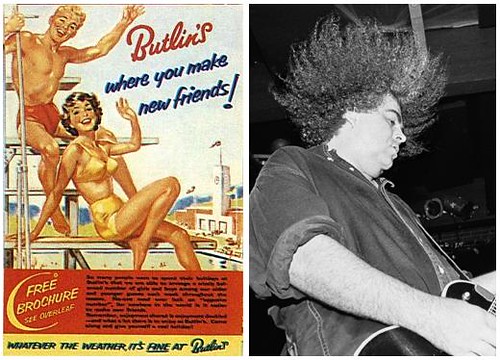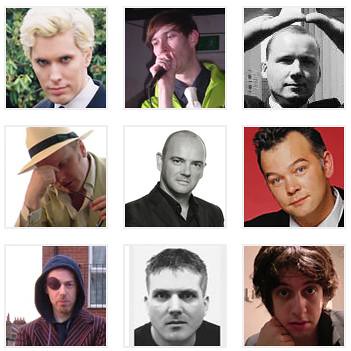
Returned yesterday from ATP’s Nightmare Before Christmas music festival. It was great. Obviously. But also weird.
I had never been to an ATP event before and while I knew prior to the event that it consisted of a rock festival within the tacky confines of a Butlins holiday camp in December, it was difficult not to notice the semiotic clash. While bearded goths, tattooed punks and tweed-clad dandies wondered around the complex with their rolled up Six Organs of Admittance posters under their arms, a giant plastic red-coat oversaw them all like some garish overlord. While cocaine was being publicly shoveled up every quivering nostril, it was still possible to win a Super Mario doll on the grabbers. It was Cool meets Kitsch. It was Chic meets Shabby. It was Summer meets Winter. It was Boogie Nights meets Phoenix Nights. It was… well, you get the idea. Good Morning, Motherfucking Campers.
“Are you sure this is the right place?” I asked my chums as I spotted the taxidermy-like display of stuffed Christmas reindeer suspended from the ceiling of the reception lobby.
Event highlights included double drumming from The Melvins and interesting stuff by Deerhoof, Dinosaur Jr. and Nurse With Wound.
Above all perhaps, Iggy and The Stooges were fucking incredible. Their set resulted in the removal of many garments, their being saturated entirely in what I assume was sweat. Don’t look at me so accusingly, dear reader, everyone was doing it.
I’m reluctant to write any more about this as it would just be a huge stream of ‘this was good’ and ‘that was great’. I’m no music reviewer and I’d make an arse out of myself if I were to even attempt to become critical on the matter. Besides, who gives a shit about anyone’s opinions on music? Music is a primal artform which probably shouldn’t be engaged with on too intellectual a level. Yes. Take that, Momus.
A final story, however, involves one of those mechanical ‘Whack the Croc’ arcade machines at which you pay 30p to smack plastic crocodiles on their heads with a padded mallet. It appears that a virtual version can be played here if you are a nerd or if you live in the East End of Glasgow and are understandably scared to leave your house. I’d been bursting to have a go on the machine all weekend and on Monday afternoon I finally made the time. But when I got to the machine there was no mallet to be found. The fucking thing must’ve been stolen by some drunken holiday camp yobbo. Not wanting to be bested, I payed my money and rather than using the hammer, I just punched them! With my naked fist! It hurt like sweet fuck but it was worth it. And the ladies came crowding around. At last I was a man. I was Paul Hogan. I was Steve Irwin.
When I’d finally finished punching, the machine vomited four tickets out onto the floor which could presumably be exchanged for a prize at the arcade kiosk. I gave them to one of the spectating babes. Smooth.
I think this is what music festivals are all about. Sure, you can make new friends and dance to music; have sex with strangers and take a bunch of drugs. But for me, they are about punching plastic crocodiles with your fist.
You can look at some of my rubbish photographs from the event here though this guy’s pictures are far more impressive.



 It’s a paragraph that has stuck with me simply because I’m so convinced that it will apply to me. By the time I’m in that Autumn of my life, I don’t think I’ll be cursing myself for a wasted youth but rather getting comfortable in my new older guy’s face.
It’s a paragraph that has stuck with me simply because I’m so convinced that it will apply to me. By the time I’m in that Autumn of my life, I don’t think I’ll be cursing myself for a wasted youth but rather getting comfortable in my new older guy’s face.








 Perhaps the most interesting nugget of wisdom I picked up, however, actually goes toward talking me out of wanting to live in any such fashion: “The best works of art are the expression of a man’s struggle to free himself from this [entrapped] condition”. I’m reminded of an
Perhaps the most interesting nugget of wisdom I picked up, however, actually goes toward talking me out of wanting to live in any such fashion: “The best works of art are the expression of a man’s struggle to free himself from this [entrapped] condition”. I’m reminded of an